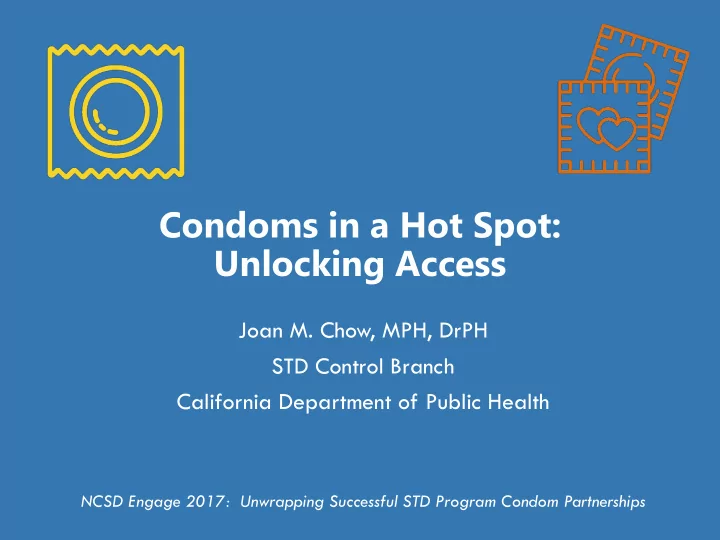

Condoms in a Hot Spot: Unlocking Access Joan M. Chow, MPH, DrPH STD Control Branch California Department of Public Health NCSD Engage 2017: Unwrapping Successful STD Program Condom Partnerships
What are we covering today? • Measuring condom access in partnership with the 2016 Healthy Stores Survey conducted by the Tobacco Control Program • Methods and Findings • Press coverage • Lessons for partnering with other programs
Healthy Stores is a California statewide survey of tobacco retailers also covering food, alcohol, and condom availability.
Why partner with Healthy Stores?
California STD rates are high, and getting higher! Rate per 100,000 population Chlamydia 500 504.4 (N=198,503) 400 300 Gonorrhea 164.3 200 (N=64,677) 100 Early Syphilis 28.5 (N=11,222) 0 1990 1995 2000 2005 2010 2016 Year
Condoms are an important STD prevention tool, but many challenges exist for youth to obtain condoms. Of 177 young people who ordered condoms to be delivered at home through the CA Condom Access Project, the two main reported barriers to buying condoms were embarrassment and cost. Embarrassment 54% Cost 53% Transportation 38% Didn't know where to buy 13% Other 5% Data Source: Home Mailer Youth Surveys, October 2013-February 2015
Retail store condom access has many advantages over public health free condom distribution • Require less travel • More densely located • More sustainable
STDs are not evenly distributed...
…Neither are condoms Previous research shows that: • Condoms are oddslot less likely to be available in disadvantaged areas. • Limited availability of condoms was found to be significantly associated with higher STD rates. Rizkalla, 2010; Shacham, 2015
Healthy Stores Survey Methods
Sampling • Random sample of zip codes with all eligible stores surveyed within each zip • Stores had to be licensed to sell tobacco and not restrict youth surveyors from entering • Over 7,100 total stores surveyed statewide
Behind counter, visible Behind counter, not visible On shelf, locked up On shelf, unlocked
Healthy Stores Survey Findings
81% of surveyed stores sold condoms. Only 5 counties reported that fewer Availability of condoms in than 70% of stores counties ranged from sold condoms. 49-92% .
But in only 37% can you purchase condoms without asking for a clerk’s help. Availability of unlocked Nearly twice as many stores sell condoms in counties alcohol as sell ranged from unlocked condoms. 10-82% .
Average price of 3 condoms For all stores: $3.82 Corner stores: $3.43 Drugstores/pharmacies: $5.60 For public health programs: $0.30
Is there a relationship between distribution of stores selling unlocked condoms and GC rates?
Geographic analysis • GC “hotspots” were defined as zip codes in the top 15 th percentile of rates. • Exclusions • GC cases that did not have a geocodable zip code in- state • Zip codes that had less than 21 GC cases • Zip codes that had less than 7 stores surveyed • 182 total zip codes were included (36 hotspots and 146 non-hotspots), covering 4,910 stores.
San Francisco Rate: 566.8 Rate: 246.8 % unlocked: 26.5% % unlocked: 40% Rate: 2,514.1 % unlocked: 38.5% Rate: 499.5 % unlocked: 0%
Bakersfield, KERN County Rate: 745.7 % unlocked: 26.1% Rate: 361.6 % unlocked: 9.4% Rate: 207.2 % unlocked: 36.5%
California In hotspots, an average of 27% of 27% stores sold unlocked condoms. In non-hotspots, an average of 47% 47% of stores sold unlocked condoms.
Press Coverage
http://www.vcstar.com/story/news/local/2017/03/08/stores-flood-kids-poor- choices-officials-say/98867590
https://www.edhat.com/site/tidbit.cfm?nid=182697
Lessons from partnering with other public health programs
Side Benefits • Increased awareness of STDs, importance of condoms among colleagues in alcohol, tobacco, and nutrition • Generated lots of press about condoms and STDs
What’s next? • Educate retailers in GC hotspots to improve accessibility • Consider financial incentives for “healthy stores”who integrate condom access • Improve targeting free condom distribution
Collaborate with existing surveys to measure retail condom access Henriksen L, et al. Tob Control 2016;25:i67–i74. doi:10.1136/tobaccocontrol-2016-053076
Fewer silos mean better work!
Acknowledgements • California Tobacco Control Program; Nutrition Education & Obesity Prevention Program; Substance Use Disorders Program • Dan Wohlfeiler, MJ MPH, Chief, Office of Public/Private Partnerships, CDPH STD Control Branch • Emily Han, MPH, Epidemiologist, CDPH STD Control Branch • Photo credits to Healthy Stores for Healthy Community Survey • Icon credits to respective authors on The Noun Project (thenounproject.com)
Questions?
Recommend
More recommend